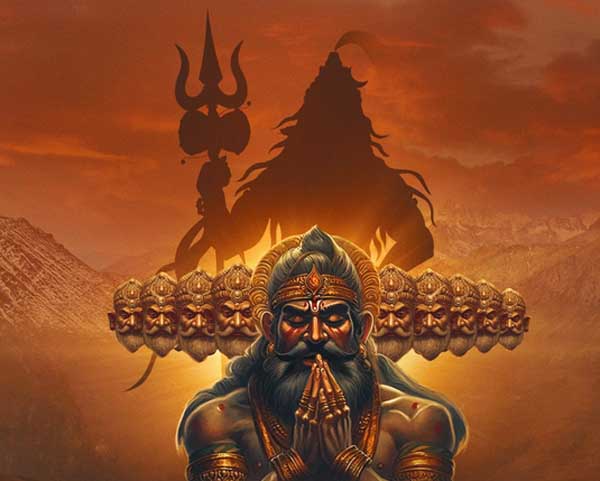While Ravana is primarily portrayed as the antagonist in the Ramayana due to his actions and arrogance, there are a few good qualities and attributes that can be considered positive or noteworthy, depending on how you view them:
Scholarship and Wisdom: Ravana was a highly educated
and knowledgeable scholar. He possessed a deep understanding of various
subjects, including music, arts, warfare, and the Vedas. His wisdom and
intellect are often acknowledged in the epic.
Devotion to Bhagavan Shiva: Ravana was a devoted
worshiper of Mahadev Shiva, one of the principal deities in Hinduism. His
unwavering devotion to Mahadeva Shiva earned him respect among some sections of
society, and it is said that he gained immense power through his penance.
Bravery and Fearlessness: Ravana displayed immense
courage and fearlessness, especially in his confrontations with Lord Rama. His
valor in the battlefield is sometimes acknowledged as a positive quality, even
though it was misguided.
Administrative and Organizational Skills: Ravana was a competent ruler who had established a prosperous and well-organized kingdom in Lanka. His ability to govern efficiently and maintain a strong administration is a notable quality.
Musical and Artistic Talent: Ravana was a skilled
musician and composer. He is credited with creating some melodious tunes and
musical instruments. His artistic talents are mentioned in various versions of
the Ramayana.
Ravana and the Veena: Ravana is often depicted as a
skilled veena (a musical instrument similar to a lute) player. He is said to
have been a master of this instrument and used it to sing hymns and compose
songs in praise of Lord Shiva, his principal deity.
Shiva Tandava Stotram: One of the most famous
instances of Ravana's musical and poetic talents is the composition of the
"Shiva Tandava Stotram." This is a hymn in praise of Shiva Bhagavan
and is attributed to Ravana. It is renowned for its lyrical and rhythmic
qualities and is considered a masterpiece of Sanskrit poetry. The Shiva Tandava
Stotram is often recited and sung in various musical renditions.
Sanskrit Scholar: Ravana is described as a highly
educated and erudite scholar. He is said to have been well-versed in many fields
of knowledge, including Sanskrit literature, poetry, and philosophy. His
mastery of Sanskrit is often emphasized as part of his intellectual prowess. He
is often depicted as a patron of the arts and literature, and his court is said
to have been a hub of intellectual and cultural activities.
Debates with Sages: Ravana's knowledge of Sanskrit
and his intellectual acumen are also showcased in his debates with sages and
scholars. He is known for engaging in philosophical discussions and debates on
various topics.
Repentance and Realization:
In some versions of the Ramayana, it is depicted that Ravana experiences a
sense of repentance and seeks spiritual enlightenment or forgiveness from Sri
Rama shortly before his death. This repentance is considered to be a
significant moment in his character arc and adds a layer of complexity to his
portrayal. As Ravana faces imminent defeat and death in the battle against Bhagavan
Rama, he is said to have moments of reflection and realization. He begins to
understand the gravity of his actions, including the abduction of Sita and his
defiance of dharma (righteousness).
It's important to note that Ravana's positive qualities
should be considered in the context of the epic and should not overshadow his
negative actions and character flaws, which ultimately led to his downfall. The
Ramayana primarily focuses on the triumph of good over evil, with Bhagavan Sri
Rama representing dharma (righteousness) and Ravana symbolizing adharma
(unrighteousness).
